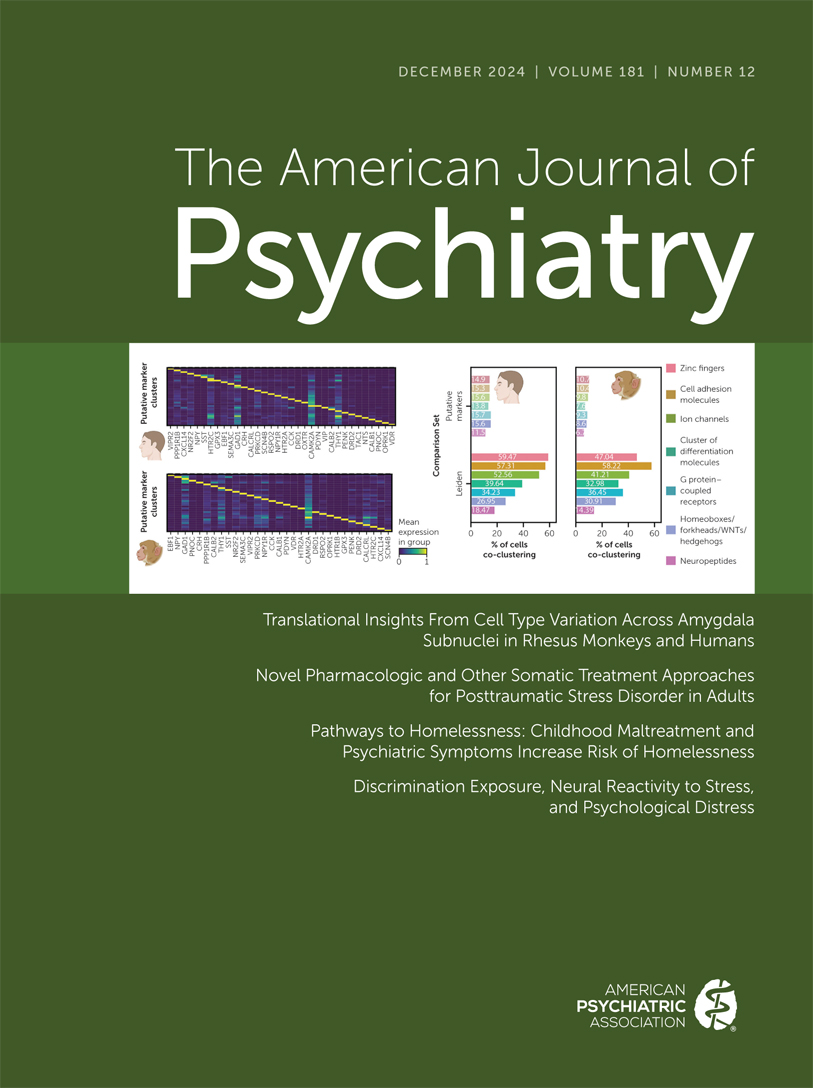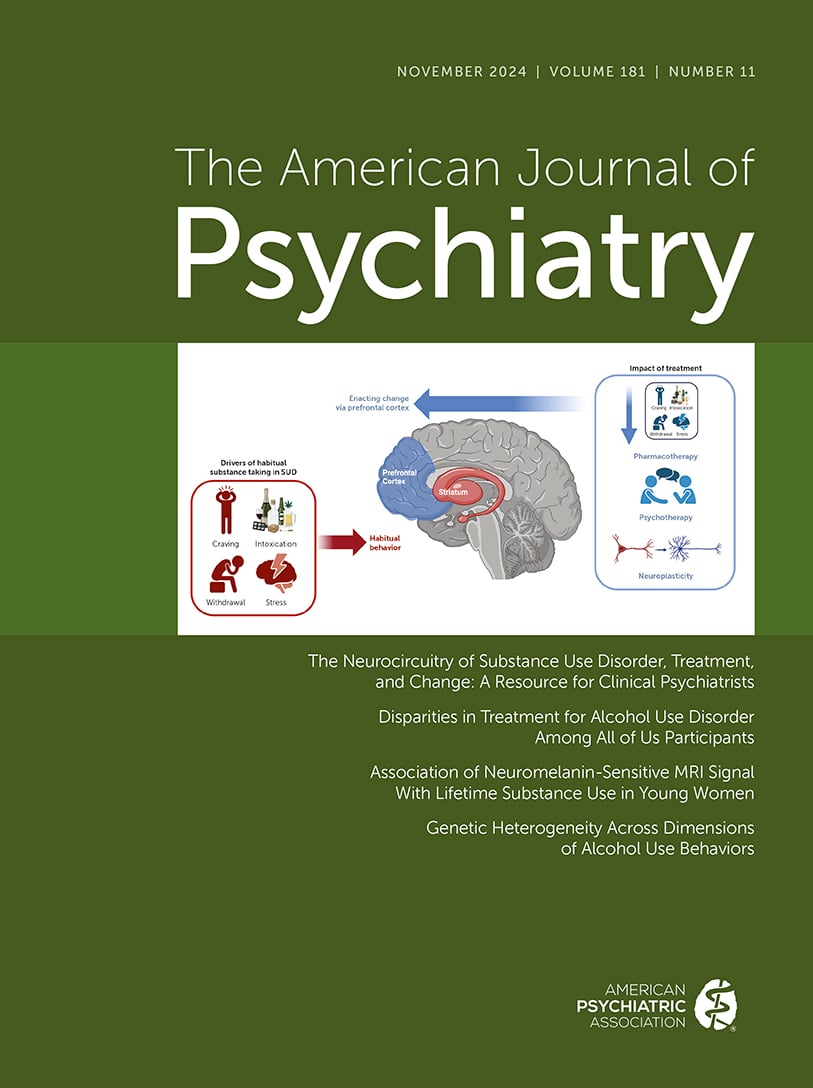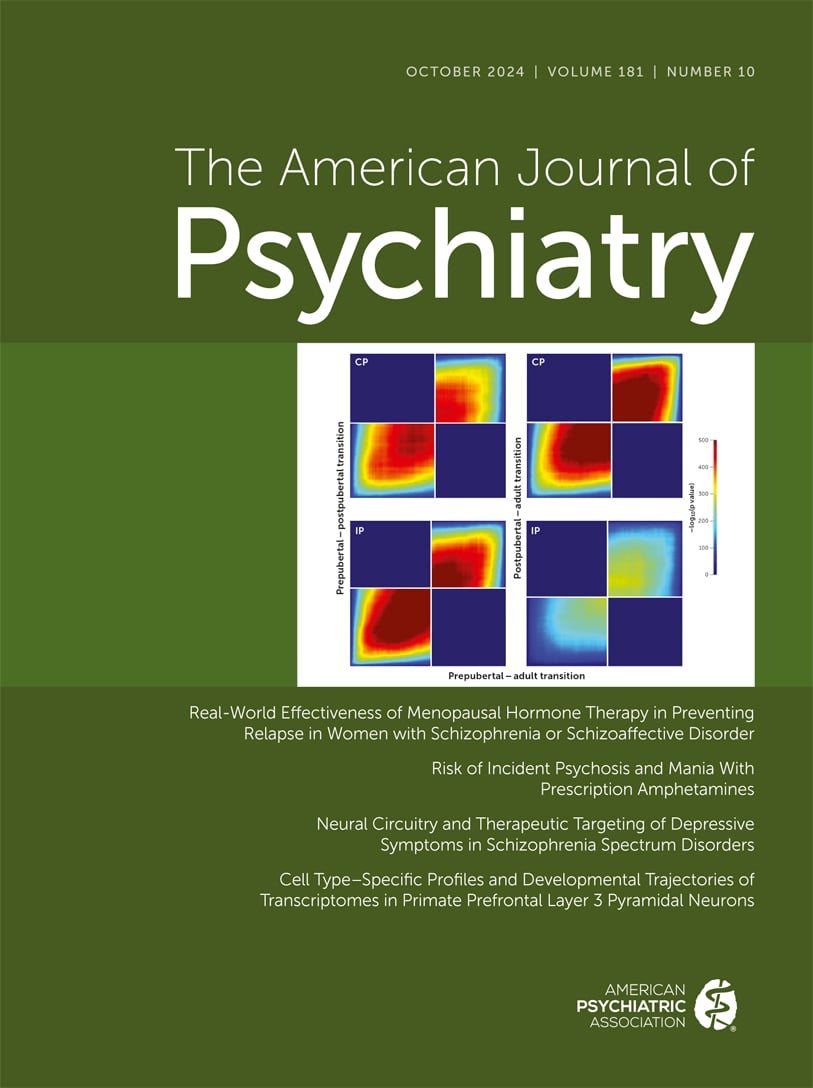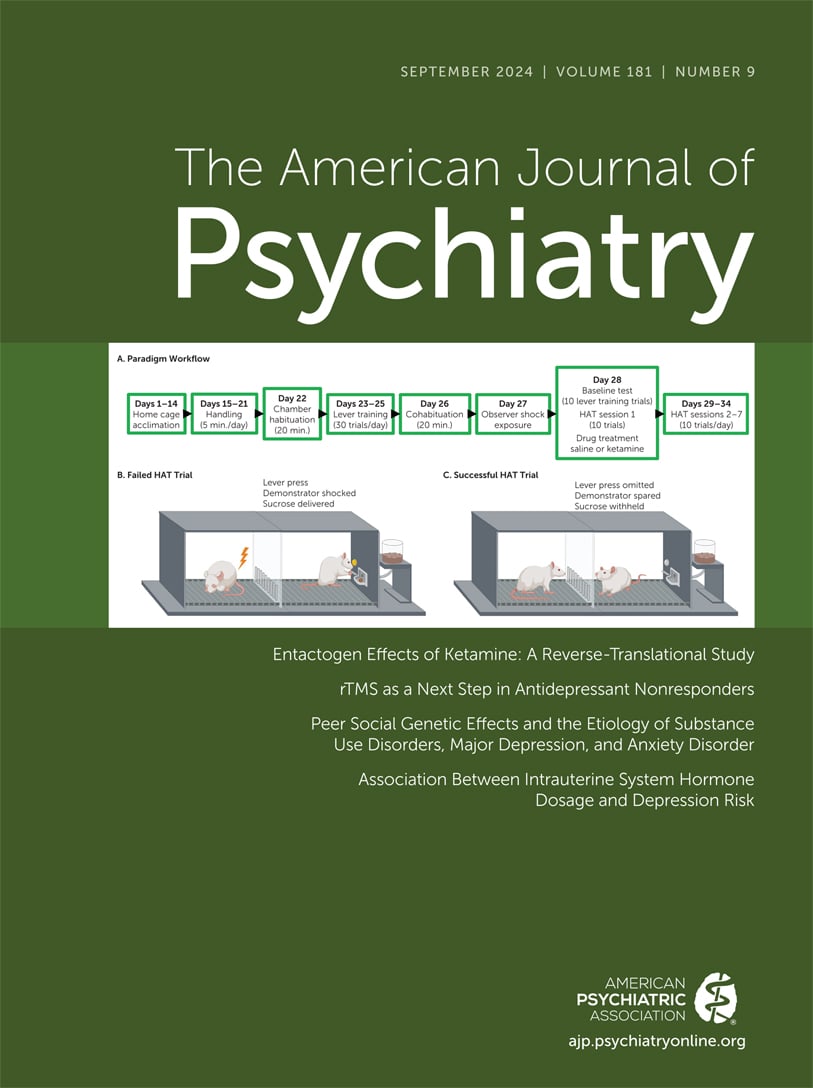American Journal of Psychiatry
- Volume 159
- Number 1
- January 2002
Editorial
Reviews and Overviews
Publication date: 01 January 2002
Pages5–11OBJECTIVE: Although four meta-analytic reviews support the efficacy of pharmacotherapy and behavior therapy for the treatment of insomnia, no meta-analysis has evaluated whether these treatment modalities yield comparable outcomes during acute treatment. ...
https://doi.org/10.1176/appi.ajp.159.1.5Images in Neuroscience
Clinical Case Conference
Images in Psychiatry
Article
Publication date: 01 January 2002
Pages23–29OBJECTIVE: Genetic epidemiologic and clinical data suggest that comorbid panic disorder may define a subtype of bipolar disorder. Comorbid panic disorder might thereby influence the strength of association between bipolar disorder and genes that have been ...
https://doi.org/10.1176/appi.ajp.159.1.23Publication date: 01 January 2002
Pages30–35OBJECTIVE: Panic attacks are a common complication of affective disorder, although the etiologic relationship of panic and affective symptoms has not been determined. Evidence from a family study suggests that panic attacks and panic disorder may be ...
https://doi.org/10.1176/appi.ajp.159.1.30Publication date: 01 January 2002
Pages36–42OBJECTIVE: The substantial discrepancy in the male-to-female ratio between clinic-referred (10 to 1) and community (3 to 1) samples of children with attention deficit hyperactivity disorder (ADHD) suggests that gender differences may be operant in the ...
https://doi.org/10.1176/appi.ajp.159.1.36Publication date: 01 January 2002
Pages43–47OBJECTIVE: This study described the natural history of depression in mothers who recently gave birth in a low-income country and to investigate the effect of risk factors, particularly related to infant gender bias, on the occurrence and outcome of ...
https://doi.org/10.1176/appi.ajp.159.1.43Publication date: 01 January 2002
Pages48–54OBJECTIVE: Maternal prenatal smoking has been found to be related to externalizing behavior problems in male offspring, but this relationship has rarely been examined in female offspring. Preliminary evidence suggests that maternal prenatal smoking may be ...
https://doi.org/10.1176/appi.ajp.159.1.48Publication date: 01 January 2002
Pages55–58OBJECTIVE: Several epidemiological studies have demonstrated a higher prevalence of panic disorder in women than in men. This study explored whether the prevalence of specific panic symptoms differs by gender. METHOD: National Comorbidity Survey data from ...
https://doi.org/10.1176/appi.ajp.159.1.55Publication date: 01 January 2002
Pages59–65OBJECTIVE: The authors assessed schizophrenia-associated changes in volume and neuronal number in the mediodorsal nucleus and the pulvinar regions of the thalamus. METHOD: Right-hemisphere thalami obtained at autopsy from 14 schizophrenic and eight ...
https://doi.org/10.1176/appi.ajp.159.1.59Publication date: 01 January 2002
Pages66–73OBJECTIVE: The cAMP-dependent enzyme protein kinase A phosphorylates intracellular proteins upon activation and thereby plays a major role in mediating various physiological functions in the brain. To examine the role of this enzyme in suicidal behavior, ...
https://doi.org/10.1176/appi.ajp.159.1.66Publication date: 01 January 2002
Pages74–81OBJECTIVE: In Down’s syndrome (trisomy 21), a dementia syndrome occurs that is phenotypically similar to Alzheimer’s disease; the initial phase is characterized by memory loss. The authors used an in vivo structural technique in the predementia stage of ...
https://doi.org/10.1176/appi.ajp.159.1.74Publication date: 01 January 2002
Pages82–87OBJECTIVE: The authors’ goal was to validate the clinical criteria for vascular dementia of the State of California Alzheimer’s Disease Diagnostic and Treatment Centers (ADDTC), the National Institute for Neurological Disorders and Stroke–Association ...
https://doi.org/10.1176/appi.ajp.159.1.82Publication date: 01 January 2002
Pages88–95OBJECTIVE: Obsessive-compulsive disorder (OCD) typically begins early in life and has a chronic course. Despite the need for long-term treatment, the authors found no placebo-controlled studies that have examined the relapse-prevention efficacy of ...
https://doi.org/10.1176/appi.ajp.159.1.88Publication date: 01 January 2002
Pages96–102OBJECTIVE: The efficacy of fluoxetine in the acute management of bulimia nervosa is well established; however, few controlled studies have examined whether continuation of pharmacotherapy provides protection from relapse. This study compared the efficacy ...
https://doi.org/10.1176/appi.ajp.159.1.96Publication date: 01 January 2002
Pages103–108OBJECTIVE: Pharmacy refill records were used to compare medication adherence in outpatient veterans receiving typical versus atypical antipsychotic medications. METHOD: Consecutive patients meeting selection criteria and receiving prescriptions for ...
https://doi.org/10.1176/appi.ajp.159.1.103Publication date: 01 January 2002
Pages109–115OBJECTIVE: Clozapine produces EEG abnormalities and dose-dependent risk of epileptic seizures. Much less is known about EEG effects of newer antipsychotics. The present study therefore examined the risk of EEG abnormalities associated with various ...
https://doi.org/10.1176/appi.ajp.159.1.109Publication date: 01 January 2002
Pages116–121OBJECTIVE: Because treatment of the depressed phase of bipolar disorder is a clinical challenge and hypothyroidism is known to be associated with depression, the authors examined the relationship between pretreatment thyroid values and response to ...
https://doi.org/10.1176/appi.ajp.159.1.116Publication date: 01 January 2002
Pages122–129OBJECTIVE: It has been proposed that 50%–75% of the efficacy of antidepressant medication represents the placebo effect, since many depressed patients improve when treated with either medication or placebo. This study examined brain function in depressed ...
https://doi.org/10.1176/appi.ajp.159.1.122Brief Report
Publication date: 01 January 2002
Pages130–133OBJECTIVE: Proton magnetic resonance spectroscopy (1H-MRS) studies of medicated patients with schizophrenia suggest high choline levels in the caudate nucleus. However, assessments of antipsychotic-naive patients are needed. METHOD: The authors studied 11 ...
https://doi.org/10.1176/appi.ajp.159.1.130Publication date: 01 January 2002
Pages133–135OBJECTIVE: Atypical antipsychotics are thought not to elevate prolactin levels. The authors examined data suggesting that atypical antipsychotics do elevate prolactin levels but more transiently than typical antipsychotics. METHOD: Prolactin levels in 18 ...
https://doi.org/10.1176/appi.ajp.159.1.133Publication date: 01 January 2002
Pages136–137OBJECTIVE: Folate deficiency in early pregnancy and maternal adiposity, independent of folate intake, lead to a greater risk of neural tube defects in infants. Atypical antipsychotics cause various degrees of weight gain. The authors assessed folate ...
https://doi.org/10.1176/appi.ajp.159.1.136Publication date: 01 January 2002
Pages138–140OBJECTIVE: This study attempted to statistically distinguish subgroups of murderers with mental disorders from among 26 hospitalized men (mean age=34 years) who were committed to a maximum security forensic hospital. METHOD: Measures consisted of ...
https://doi.org/10.1176/appi.ajp.159.1.138Publication date: 01 January 2002
Pages140–142OBJECTIVE: The authors sought predictors of treatment utilization among women with eating disorders. METHOD: Women diagnosed with either anorexia or bulimia nervosa (N=246) completed prospective evaluations of eating disorder status, comorbid disorders, ...
https://doi.org/10.1176/appi.ajp.159.1.140Publication date: 01 January 2002
Pages143–145OBJECTIVE: Changes in immunologic status were evaluated in 25 HIV-infected men randomly assigned to a 10-week stress management intervention or a wait-list control condition. METHOD: The authors monitored changes in number of transitional naive T cells (...
https://doi.org/10.1176/appi.ajp.159.1.143Publication date: 01 January 2002
Pages145–147OBJECTIVE: Previous studies have shown that neuroactive steroids modulate anxiety and stress reactivity. However, no data on the possible role of these γ-aminobutyric acidA (GABAA) receptor-modulating neuroactive steroids in patients with anxiety ...
https://doi.org/10.1176/appi.ajp.159.1.145Letter to the Editor
Book Forum: The Social and Political Contexts of Psychiatry
Book Forum: Psychodynamic Theory
Book Forum: Psychopharmacology
Book Forum: Theory and Treatment of Depression
Correction
Past Issues
View Issues Archive
Vol. 181 | No. 12

Vol. 181 | No. 11

Vol. 181 | No. 10
